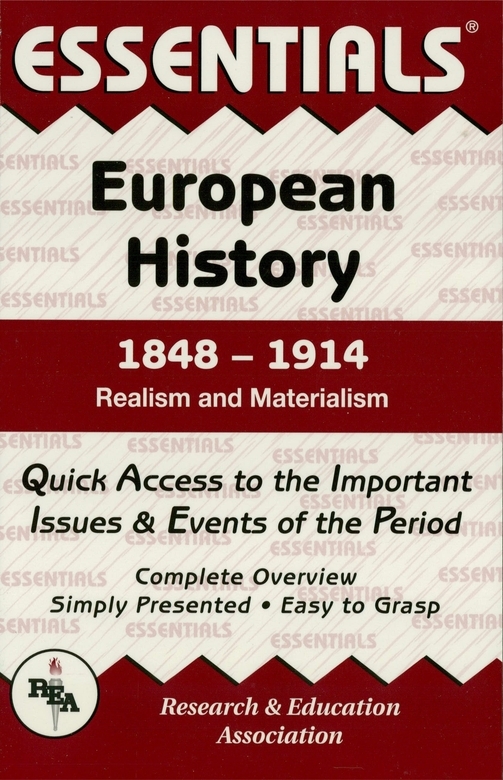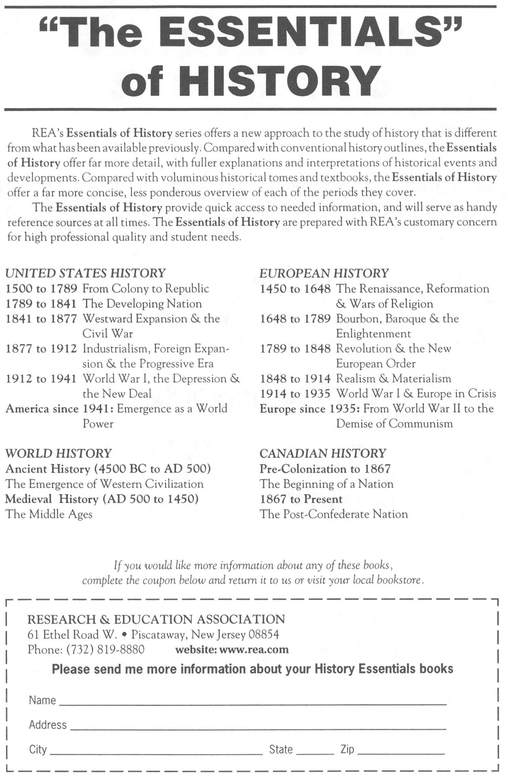About the Author
William T. Walker is chairman of the department of humanities and an associate professor of history at the Philadelphia College of Pharmacy and Science in Philadelphia. Previously, he held numerous teaching and administrative positions at Gwynedd-Mercy College at Gwynedd Valley, Penn., the University of South Carolina, Sumter, S.C., and Clemson University, also in Sumter.
Dr. Walker, the author of many scholarly articles, is a member of the American Historical Association, the Sixteenth Century Studies Conference, the Intellectual History Group, the Catholic Record Society (London), Phi Alpha Theta National History Honor Society, the North American Conference on British Studies, and the Society for Reformation Research. He has been the recipient of many awards and grants during his various tenures, and is an expert in Tudor-Stuart England, Modern Britain, and Europe since 1789.
CHAPTER 12
CONCLUSION
Between 1848 and 1914 Europeans experienced revolutionary changes in their culture. These alterations were based on a new sense of reality and values in which materialism, and the notion of human progress, were manifested in the pragmatism of the era. Nationalism, science and technology, and the rapid expansion of the population were primary factors which contributed to these changes and to the further expansion of European culture throughout the world. The growth in the European standard of living was uneven. Western Europe developed most comprehensively; Central Europeespecially German urban centerswitnessed remarkable growth during the last decades of the period; and Southern and Eastern Europe lagged behind and, by 1914, the standard of living had not dramatically improved from that of the earlier century. Reaction to these changes varied from the development of Marxism, anarchism, and trade unionism in response to the adverse consequences of capitalism and industrialism, to the emergence of Impressionism, Expressionism, and Symbolism in reaction to the perceived intellectual sterility of mechanistic positivism. Nineteenth-century Europewhich was identified with hope, progress, and rationalitygave way to the uncertainty, violence, and irrationality of the twentieth century. Politically, economically, and culturally, Europe between 1848 and 1914 continued the process of accelerated change which had been initiated in the previous century with revolutionary developments in production, and in the fundamental concepts about the relationships of man and the state and of man and the economy.
These Little Books have rescued lots of grades and more!
(a sample of the hundreds of letters REA receives each year)
Your Essentials books are great! They are very helpful, and have upped my grade in every class. Thank you for such a great product.
Student, Seattle, WA
I recently purchased six titles from your history Essentials series and I find them to be excellent.
Student, Dublin, Ireland
Thank you for volumes I & II of The Essentials of Statistics. I am very pleased with these two little booklets.
Student, Portland, OR
The Essentials book always comes to the rescue.
Student, Norwood, MA
Ive had the pleasure of using your Essentials of Physics study guide books, and have found them to be very helpful.
Student, Minneapolis, MN
(More on front cover)
CHAPTER 1
EUROPE IN 1848
1.1 THE REVOLUTIONARY TRADITION
The era of reaction which had followed the collapse of the Napoleonic regime and the Congress of Vienna (1815) was followed by a wave of liberal and national agitation which was manifested in the Revolutions of 1820, 1825, and 1830.
The liberals, who tended to control the revolutionary agenda in Western Europe, desired constitutional government and the extension of individual freedomsfreedom of speech, press, and assembly. Liberal reforms and programs were advanced in the more economically advanced societies which had significant middle classes. In. Central, Eastern, and Southern Europe, nationalism was the primary force for change. The advocates of nationalism sought to dismantle the traditional dynastic political controls which prohibited the formation of genuine nation-states. In addition to these factors, other reformers had succeeded in placing the need for social and economic improvement of the masses on the revolutionary platform; this was especially evident in France and England.
During the 1840s the movement toward revolutionary change was supported by four factors:
- The failure of the existing regime to address the economic and social problems which accompanied the general economic collapse which occurred during the decade.
- The regularity of significant food shortages in the major urban centers.
- The increased popularity of the demands of the liberals and the nationalists.
- The increasingly radical political, economic, and social proposals advanced by the Utopian Socialists (Charles Fourier, Robert Owen), the Anarchists (Pierre Proudhon), and the Chartists in England.
1.2 OUTBREAK AND DEVELOPMENT OF THE REVOLUTIONS OF 1848
1.2.1 France
The once liberal regime of King Louis Philippe (1830 1848) became increasingly conservative and oppressive under the leadership of Prime Minister Francois Guizot and the Chamber of Deputies. Guizots opposition to reforms resulted in the further restriction of individual rights in general and the excessive use of censorship to silence critics of the regime.
The predominantly liberal opposition scheduled a banquetwhich was a direct challenge to the regimefor the night of February 22, 1848. Guizots government refused to sanction the banquet and, as a result, students and working class men took to the streets and violence erupted. In an effort to eliminate further difficulty, Louis Philippe dismissed Guizot; however, on the evening of February 23, 1848, a conflict between government troops and opponents of the regime occurred and over fifty people were killed. Reports of the massacre spread quickly and over a thousand barricades were erected. On February 24th, Louis Philippe attempted to develop a strategy which would permit him to remain in power; but, by the end of the day, he abdicated and fled to England.























